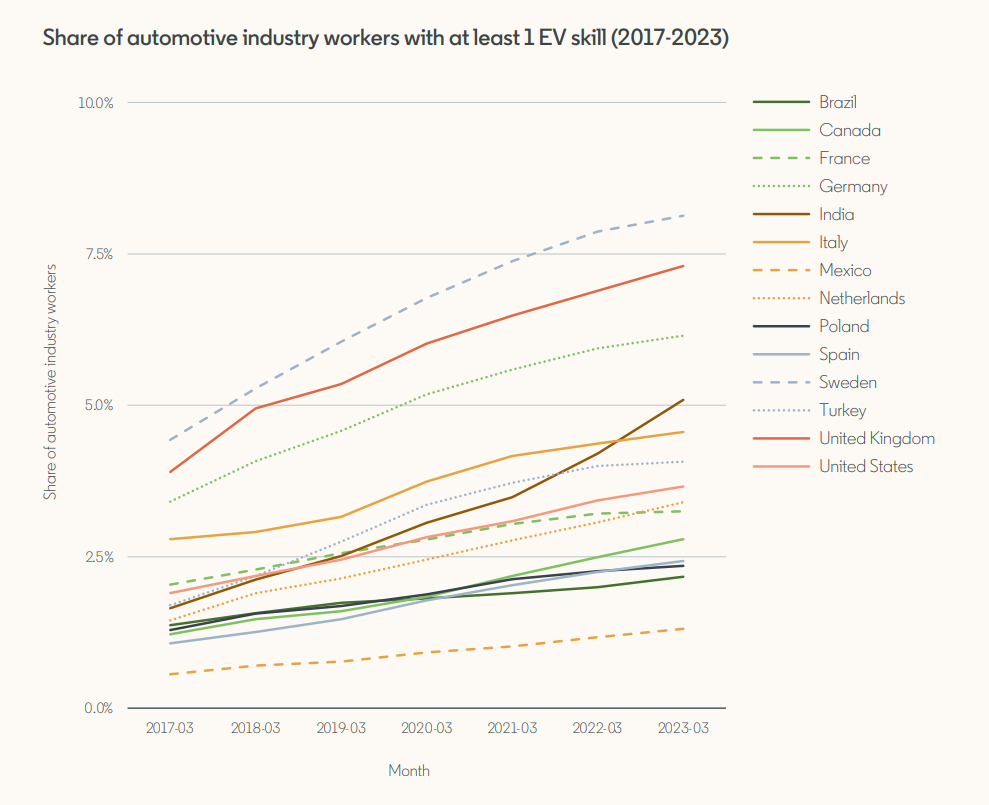
New Delhi: ‘Electric’ is the buzzword in the Indian automotive industry, with hundreds of new electric vehicle, battery and charging infrastructure companies trying to make a mark. With such a rush of manufacturers and sprouting of green infrastructure providers, is it any wonder that demand for workers with ‘green’ skills has skyrocketed?
The Global Green Skills Report 2023 by LinkedIn has shown that India already beats several other countries when it comes to the acquisition of green skills among automotive industry workers. India has trumped the USA, Mexico, Canada and several European countries, showing a 40% jump in the past five years in the number of automotive industry workers with at least one EV skill.

The demand for workers with green skills is expected to move further up in the coming years. Estimates differ, with different industry leaders pegging job creation in the EV sector at different levels, but everyone seems united in the view that millions of new roles are getting created.
Sanjay Shetty, Director, Professional Search & Selection, Randstad India, told ETAuto that by 2030, up to 10 million direct jobs will be created in the EV sector and another 50-55 million indirect job opportunities will arise. Manu Sharma, AVP HR at Hero Electric says that to build up scale, the EV industry will immediately need between five million to 10 million people. “This is across the electric mobility industry in India, not limited to just OEMs but also component manufacturers, service providers etc”.
Sameer Aggarwal, CEO and Founder at Revfin, said that about 20 million jobs will be created by 2030, encompassing a wide range of roles, from research and development to manufacturing, charging infrastructure deployment and skilled technical positions, thereby cultivating a diverse and robust employment landscape
Such a rapid increase in demand for workers with green skills has naturally led to a widening demand-supply mismatch and skills shortage. Maxson Lewis, founder and MD of the EV solutions company Magenta said, “EV technology is pure science. It is a mix of several branches of engineering – mechanical, electrical, electronics and even telecom. But even today, there are no courses which encompass all the knowledge needed to combine these science subjects for imparting necessary skills in the EV space. So there definitely is a supply side issue.”
Besides, technology for the EV ecosystem is also evolving quite rapidly, making skill upgradation a tough ask. Lewis says frequent and fast changes in battery technology, for example, create shortage of skilled workforce in the industry.
“For the next three years at least, supply will always follow demand,” he said.
Shetty of Randstad said that the domestic EV market is poised for 45-50% growth by 2030. “We expect annual EV sales in India to surpass 10 million units and this will contribute to the creation of around 8-10 million direct and 50-55 million indirect job opportunities.”
He said that in the near term, there is an increasing demand for skilled professionals and around 1.5-2 million employees. He also referred to the talent crunch.
“The EV industry is grappling with a substantial talent crunch, particularly in the domains of software, artificial intelligence, connected technologies, electric vehicle development, shared mobility solutions, and safety standards. Companies are confronted with the challenge of a rapidly expanding production pace that outpaces the time required to skill the workforce adequately,” Shetty said.
Skill shortage
Ashish Deswal, Founder, EarthtronEV, an EV charging company, points to two specific areas where there is a skills shortage: EV charging engineering and EV charging operations. Earthtron has found a novel solution for this problem. Deswal said, “Our strategy has always been to look for talent in industries which are similar to our industry. Employees in the power industry have certain skills and knowledge that can be relevant to our operations. We then take the initiative to skill them up and make them proficient with our line of work. “
Industry wide, there is a significant shortage of technicians and engineers trained in EV charging infrastructure.
Installing, maintaining, and troubleshooting EV charging stations require a unique skill set which is not widely available. Besides, professionals skilled in customer service and technical support, specifically tailored to EV charging stations, are also in short supply.
Altigreen Propulsion Labs , a Bengaluru-based manufacturer of commercial electric vehicles for the last mile segment, has not identified the specific areas where the skill gap is wide. The company has begun in-house training and handholding of professionals to bridge this gap. Girish Lobo, who has considerable experience in the automotive industry and is now the HR head of Altigreen, said that hiring for the sales and marketing functions is not difficult in the EV sector since fundamentally, skills needed for ICE vehicles and EVs in these job roles remain similar. Besides, there is eagerness from applicants to transition to the EV sector in these roles, making the hiring process easier.
“But there is a huge gap in skills needed for job roles in the embedded software function, which manages the functioning of electronic parts of EVs. People come from an ICE vehicle point of view here …We get the required candidates but then they need six to eight months of training to become proficient,” he said.
Sharma of Hero Electric said that companies often encounter skill gaps in battery thermal management, energy density improvement and safety enhancement; and in charging station design, grid integration functions.
There is also some struggle to hire the right people for data and AI application functions. Lobo of Altigreen said, “The industry for these skills is not very mature till now so sometimes do not get ideal fits. We look for those who are eager to work in the EV industry and then devise a learning and working model under experts. A mid-level professional still needs about six months of skilling and this could stretch to nine months for an entry level candidate.”
And just as there is a crunch of talented professionals in specific EV industry roles, the quantum of salary jump for specific roles can be as high as 50% or more from the current pay package. Lobo said, in R&D functions, for example, the salary increase is anywhere between 40% and-50% but for niche skills like data science and AI, the hikes are over 50%.















